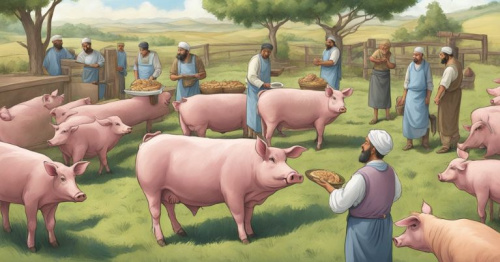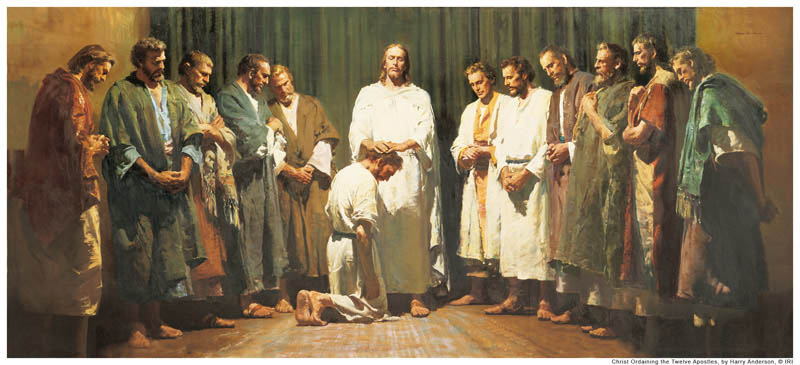Question
Gramps,
I’ve been trying to find out about pork consumption. In Acts chapter 15 Jesus says that what he cleanses we shall not call common. But it doesn’t really show that he meant pork. Can you help me understand please?
Dan
Answer
Dan,
The consumption of pork has been a contentious topic throughout religious history, particularly in the context of dietary laws outlined in the Old Testament. Let’s explore the biblical foundations of these dietary restrictions, the significant changes introduced in the New Testament, particularly through Acts 15, and the contemporary perspectives held by members of The Church of Jesus Christ of Latter-day Saints (LDS).
The Old Testament lays out a series of dietary laws that were primarily given to the Israelites as part of the Mosaic Law. These guidelines, found in books like Leviticus and Deuteronomy, include specific prohibitions against the consumption of certain animals, including pigs. Leviticus 11:7 and Deuteronomy 14:8 explicitly declare that pigs are unclean because they do not chew the cud, despite having split hooves.
The rationale behind these laws was multifaceted, including health considerations and the establishment of a distinctive identity for the Israelites as God’s chosen people. This separation was not only physical but also spiritual, as dietary laws were seen as part of the covenant relationship between God and Israel. The purpose of these laws was to set the Israelites apart from other nations, reinforcing their unique role as the people of God.
With the advent of Christianity, the early Church faced the challenge of integrating Gentile believers who were not bound by the Jewish law. Acts 15 recounts a pivotal moment where the apostles convened to address the question of whether Gentile converts should adhere to the Mosaic Law.
During this council, Peter articulated a profound insight: God had purified the hearts of the Gentiles through faith, and imposing the yoke of the law, which even the Jews could not bear, would be unnecessary (Acts 15:10-11). The decision was made that Gentiles should abstain only from certain practices, specifically “pollutions of idols, and from fornication, and from things strangled, and from blood” (Acts 15:29). This marked a significant departure from the strict dietary laws of the Old Testament.
The conclusion of the Jerusalem Council signaled a new direction for the Church, emphasizing that salvation was through faith in Christ rather than adherence to the law. This shift allowed for a more inclusive approach to dietary practices among early Christians, freeing them from the constraints of the Mosaic law, including prohibitions against pork.
Members of The Church of Jesus Christ of Latter-day Saints follow a health code known as the Word of Wisdom, which encourages moderation in all things and advises against the consumption of harmful substances. While the Word of Wisdom does not explicitly prohibit pork, it emphasizes the principle of eating meat sparingly (D&C 89:12).
LDS doctrine acknowledges the historical context of the Mosaic Law but teaches that through Christ’s atonement, the strict dietary laws were fulfilled and are no longer binding. As stated in the Church’s topical guide on meat, “Every moving thing that liveth shall be meat for you” (Gen. 9:3), highlighting the belief in the permissibility of consuming various meats, including pork.
Furthermore, many Latter-day Saints recognize the importance of personal revelation and the guidance of the Holy Spirit in making dietary choices. This principle allows for individual discretion and conscience in matters of diet, fostering a personal approach to health and wellness. The teachings of the Church encourage members to seek divine guidance in all aspects of life, including nutrition.
In the context of dietary laws, personal revelation plays a crucial role for members of the Church. The belief that individuals can receive direct guidance from God encourages members to seek personal confirmation regarding their dietary choices. This principle aligns with the broader LDS doctrine of agency, emphasizing the importance of personal choice and accountability in all aspects of life, including health and diet.
For members of The Church of Jesus Christ of Latter-day Saints, personal revelation can lead to varying dietary practices based on individual health needs, cultural influences, and personal beliefs. This flexibility allows members to adapt their diets in a way that aligns with their faith while respecting their bodies and health.
The question of pork consumption and dietary laws has evolved significantly from the Old Testament through the New Testament and into modern practice among members of The Church of Jesus Christ of Latter-day Saints. While the Old Testament laws served a purpose in their historical context, the teachings of Jesus Christ and subsequent revelations have led to a more flexible understanding of dietary restrictions. Through personal revelation and the guidance of the Holy Spirit, Latter-day Saints navigate their dietary choices with a focus on health, moderation, and faith.
Gramps







